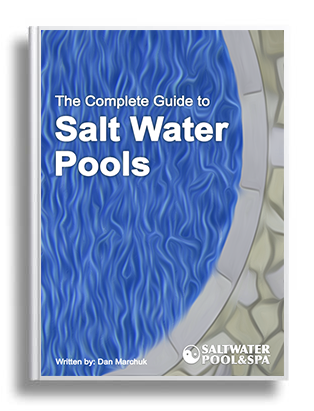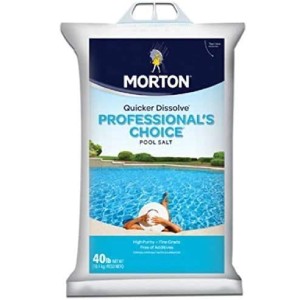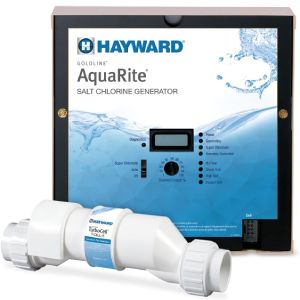- Salt Water Pool and Spa
- Salt Water Pool Systems
- Swimming Pool Salt
Swimming Pool Salt
The swimming pool salt is what turns a regular chemical chlorine pool into a luxurious and silky soft salt water pool. The water softening effects and gentle feel are just a couple of the benefits you'll notice by upgrading your pool. When you add the right kind of salt to your pool you'll wonder why you didn't switch sooner. There are a few important things you need to know when choosing the best products including purity and how quickly it dissolves which we will cover in more detail below.
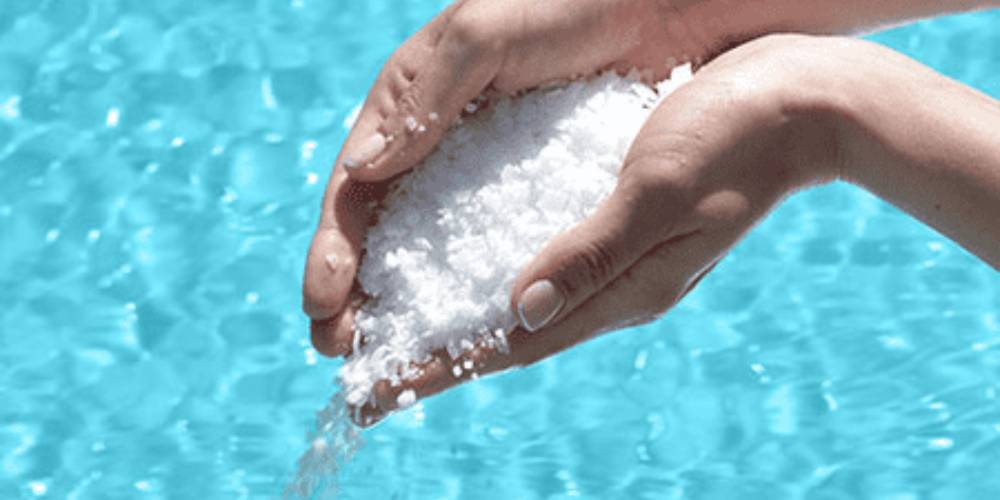
Just like the ocean, your saltwater pool will leave you feeling clean and refreshed instead of feeling like you were in a chlorine chemical bath. If you've wondered just how salty it will be or if you'll taste it you'll be glad to know that salinity levels are so low that you won't taste the salt anywhere near the intensity of swimming in the ocean. The level of salt in your pool is about the same concentration level of your tears which means you won't taste it or smell it but you will feel the amazing difference on your skin.
The Complete Guide to Salt Water Pool MaintenanceEverything you need to know to maintain your salt water pool and keep it running smoothly all season. |
|
How does Salt Create Chlorine?
Through the process of electrolysis the salt is broken down into it's base components resulting in chlorine. You can look at as free chlorine for your pool because the process can be repeating over and over again using the same salt. You will very rarely need to add chemical chlorine to your pool, aside from the occasional pool shock, but even shocking products are available in chlorine-free form.
What Does Salt do for your Pool?
It's the salt that allows the chlorine generator to create chlorine naturally so instead of pouring liquid chemical chlorine or adding an endless amount of chlorine pucks you just add salt. You will typically only need to add salt once a year during your pool opening routine and on rare occasions when you need to raise the salinity level to meet the chlorine generator requirements. Keep in mind that this level is very low and you shouldn't notice the salt when swimming other than feeling a little more buoyant.
Hayward Chlorine Generator Cell for Inground Pools up to 40,000 GallonsIf you click on this link and make a purchase, we may earn a commission. |
The Benefits of Salt
Initially you will notice that you won't smell chlorine and this is due to the fact that salt water pools operate safely on lower levels of chlorine. The salt acts as a disinfectant and naturally wards off microorganisms like algae blooms that can be a problem when chlorine levels drop in a normal chemical chlorine pool. The combination of salt and the natural chlorine that's produced are a double whammy when it comes to keeping your pool safe and sanitary.
The benefits of salt in pools go beyond bacteria fighting. You can expect to feel like you're swimming in silky soft water and notice the difference right away. The stinging sensation you can get in your eyes and nose in a regular pool will be gone and it won't feel like you were in a chemical bath. It's also gentler on skin, hair and clothes so you can enjoy your pool more often without the negative affects of high levels of chemical chlorine.
The Best Swimming Pool Salt
Salt is available almost anywhere but it's important to get the purest salt you can find and if it's specifically manufactured specifically for pools you can be sure there are no additives. If you add salt that has organic matter, additives or coagulants you can run into problems with staining, inadequate chlorine production and decrease the life of your chlorine generator because it has to work harder to convert chlorine. We recommend purchasing from a trusted pool company or salt specifically designed for pools
- At least 99.8% pure
- Evaporated and granulated
- Non-iodized and food quality
You should avoid the following additives and impurities:
- Anti-clumping agents including sodium ferrocyanic
- Calcium chloride or rock salt
Morton Pool Salt High Purity and Fast Dissolving for Chlorine GeneratorsIf you click on this link and make a purchase, we may earn a commission. |
Adding Salt to Your Pool
If you have a brand new salt water pool or converting your pool to salt water you will need to add enough salt to get the salinity level up to the recommended levels for your specific model of chlorine generator. The desired salinity can range anywhere from 2700-4500 ppm, anything above or below this range can reduce the lifespan or damage the salt cell and prevent adequate chlorine from being produced. You will typically only need to add salt once a year either when you first start up your pool or convert your existing chlorine pool.
- Check the Current Salt Level
- Determine How Much Salt is Required
- Add Salt and Mix
- Test Salinity Levels
- Turn on the Salt System
1. Check the Current Salt Level
The first step is to check the salt level in the water before adding any salt. This applies to pools that are being converted or brand new pools because the fresh water could contain salt or salt may have accumulated through other means such as rainfall. After you have tested the water to determine the current salinity level you can calculate how much you need to add to reach the desired range for your specific chlorine generator.
Cold water temperatures will affect the conductivity of the salt water and result in a lower reading than in warmer water. It's a good idea to test a water sample that has been warmed to room temperature if the water is colder or warmer than usual. It's important to wait at least one month after a new pool construction when plaster is used. The plaster needs to cure completely before introducing salt or any pool chemicals as they could corrode the surface.
2. Determine How Much Salt is Required
Adding the correct amount of salt is important and it's a good idea to add a little bit less than you calculate. This will allow you to test the salinity and add more salt if required to avoid needing to remove some water from your pool and replace with fresh water which is time consuming and a nuisance. When using the Salt Demand Calculator below be sure to test your water first to determine if there is any salt already in your pool. This is surprisingly common especially with pools that are located close to the ocean.
Salt Demand Table Calculator
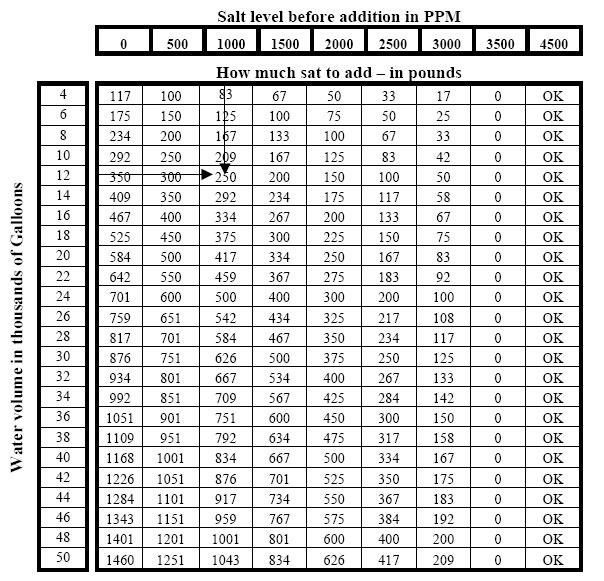
3. Add Salt and Mix
Make sure the salt water system, pump and chlorine generator are all turned off and of course make sure your chemistry is balanced. Start by slowly pouring the salt around the outer perimeter of the deep end of your pool and working back and forth while walking at a slow pace. The salt should be added to your pool water in a manner that allows for fast and easy absorption. If you purchased a quality pool salt it will be designed to dissolve quickly and you won't get any settling on the bottom of your pool.
If you end up with salt settling to the bottom of the pool you use an extendable pole with attached brush to stir it until it's dissolved completely. This may take 15 to 20 minutes depending on how fast the salt dissolves. The goal is to not have any salt on the bottom of the pool and you may notice the water looks cloudy but this is normal. After you feel that the salt is dissolved you can turn your pump on but at this time don't turn your chlorine generator or salt system on.
Hayward Goldline Salt Water System for Inground Pools up 40,000 GallonsIf you click on this link and make a purchase, we may earn a commission. |
4. Test Salinity Level
After waiting 24 hours test the salinity and if you still need to add swimming pool salt you can repeat the process again. Make sure to not turn on the salt system or chlorinator until you are completely satisfied your salinity is within the manufacturers recommended range. If your salt system control panel has a salinity display you can check the salinity level on the panel. We also recommend double checking with a digital salinity tester to ensure you are getting your pool off on the right track and the salinity isn't too high.
5. Turn on the Salt System
If you are satisfied that the salt is completely dissolved, had a chance to mix for 24 hours and you've retested the salinity it's time to start making chlorine. Once you start the chlorine generator it will instantly start creating natural chlorine. As long as your pool chemistry is balanced you will be enjoying many days of swimming in silk smooth salt water.
Swimming Pool Salt FAQs
What is the best salt to use in a salt water pool?
What is the best salt to use in a salt water pool?
You should use a salt that's at least 95% to 99% pure mined sodium chloride. The higher purity makes it easier to dissolve, less chance of staining, optimizes chlorine production and extends the life of the chlorine generator cell.
Is Morton pool salt good?
Is Morton pool salt good?
Morton pool salt is 99% pure and arguably the best pool salt you can use in your pool. A pure sodium chloride with no additives will dissolve faster, won't stain and will enable the chlorine generator to create enough chlorine for a healthy pool.
Are all swimming pool salts the same?
Are all swimming pool salts the same?
While all salt has the same basic properties, they vary in the additives they can contain. You want to avoid salts that are contaminated with organics, foreign minerals and metals.
How much salt do I need to add to create a salt water pool?
How much salt do I need to add to create a salt water pool?
A typical 20,000 gallon pool will require about 600 pounds of salt assuming salinity levels were at 0. Most professional grade salts are sold in 50 pound bags so you would need 12 bags of salt to start your salt water pool.
Why is my salt not dissolving in my pool?
Why is my salt not dissolving in my pool?
If you've added a salt that's at least 95% pure it will eventually dissolve. You may need to encourage the process by mixing with a pole and brush if you notice salt settling on the bottom of the pool. The goal is to achieve about 2700 to 4500 ppm salinity but that depends on your specific chlorine generator specifications.
Can I add Epsom salt to my pool?
Can I add Epsom salt to my pool?
You should never add salts that aren't at least 95% purity.
Do I need to add salt to my pool every year?
Do I need to add salt to my pool every year?
The salt in your pool can be recycled endlessly and never goes bad. You may need to add salt if you've had significant splash out, heavy rainfall or significant evaporation. Any time you add fresh water to your pool you will need to adjust the salinity back to required levels.
What is the fastest dissolving pool salt?
What is the fastest dissolving pool salt?
Any salt that has a high purity. Morton pool salt is 99% pure and therefore dissolves the fastest.
How do I know if I need to add salt?
How do I know if I need to add salt?
You should constantly monitor the salinity level in your pool. Pool water salinity is typically monitored and displayed on the control panel of salt water systems or you can use a digital tester that instantly reads salinity.
Disclaimer
Please use all appropriate and proper safety precautions when attempting projects on this website. All projects are attempted at the reader's own risk.
Salt Water Pool and Spa™ participates in the Amazon Services LLC Associates Program, as an Amazon Associate we may earn a commission from qualifying purchases.
